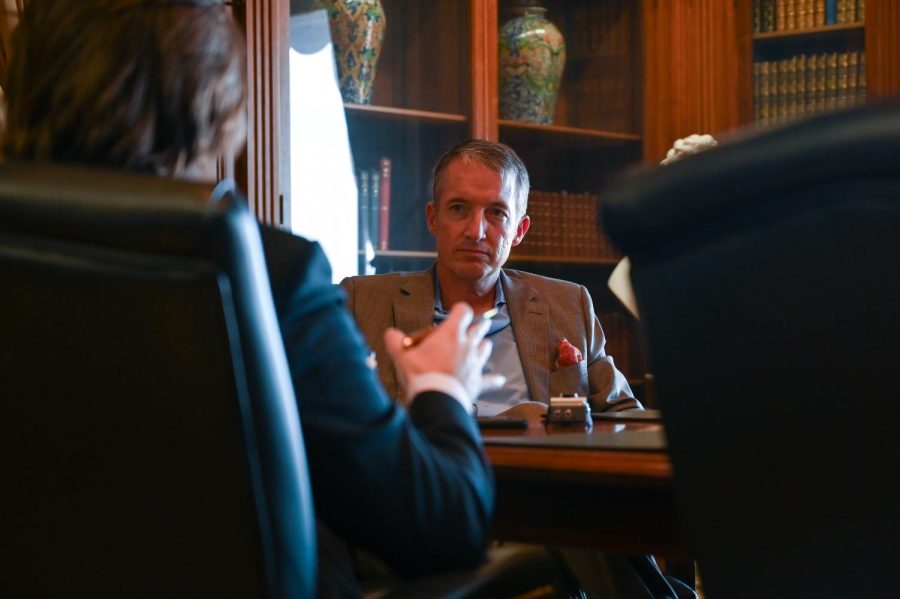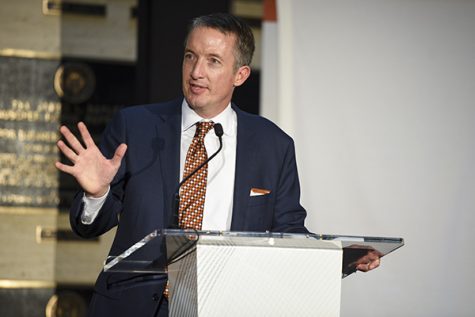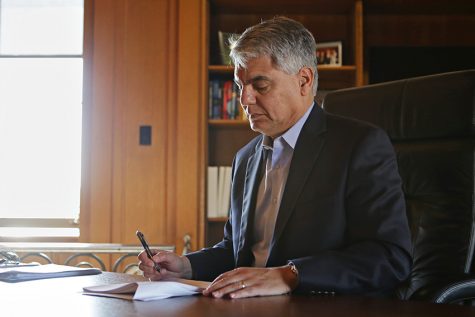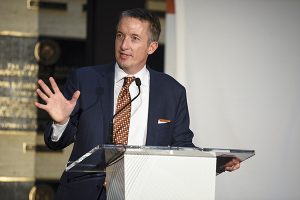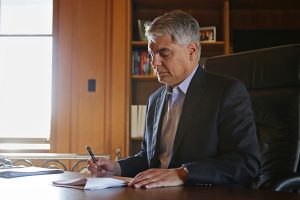Q&A: UT President Jay Hartzell talks reproductive rights, ‘The Eyes of Texas,’ affordability, COVID-19, more
September 15, 2022
Editor’s note: This interview has been condensed for clarity. Listen to the full interview below or here.
For the first time in nearly two years, The Daily Texan sat down with President Jay Hartzell to ask about the University’s response to COVID-19, the overturning of Roe v. Wade, “The Eyes of Texas,” housing affordability and more.
COVID-19
The Daily Texan: How do you feel the University handled COVID-19 over the past two and a half years, and was it done well?
Jay Hartzell: The University community at large handled it well. We had a couple of key decisions to make back when it was unfolding. It’s also important to realize how little we knew when it first was happening. We didn’t know how (COVD-19) was spreading and what precautions to make. A couple of things worked well for us. One was trying to focus on the spirit of positivity, and not for example, penalizing students who went to parties or that kind of thing; instead trying to encourage what we thought was positive sources of behavior. I think that set the right tone for the campus.
I don’t want to go back and redo those years, but I thought the campus rallied and it was not a good experience by any stretch, but it was unifying.
DT: Now we’re all generally back in person for the most part. How can UT help the campus community get back to that more collegial and vibrant environment?
JH: We’re spending a lot of time thinking about how can we create more of that unifying, collegial, fun, vibrant, campus setting…We’re worried about trying to provide an environment where students, in particular, feel like they want to be here all day, that it’s a place they might want to come back at night or be around. And I’m also cognizant of students who might live farther away from campus and having them feel like this is a place they can get their work done, but also hang out and get to experience it. So it’s everything from trying more events (and) planning for more capacity at those events. We’ve seen an incredible attendance this year at things that have happened in person and then we’re also making a new renewed push on things like live music on campus.
Roe v. Wade
DT: Roe v. Wade was overturned this summer and with that, abortions have now been severely restricted in Texas. We’ve heard anecdotally from a lot of students that they’re just concerned now that they’ve lost their reproductive rights. And we’ve also reported that (some potential) incoming students aren’t choosing UT because of the laws, so what are your thoughts on these student concerns?
JH: We have to follow the state and federal laws and so that is the world we live in and we’ll continue to do so. It’s important for the University to do what we can to communicate what resources are out there for students. So the communications team with the health experts in the Dean of Students office put a lot of work into an FAQ, trying to be very forthcoming about where students can find out more and what we can and can’t say, or can and can’t do as (a) university.
Academic freedom
DT: Lt. Gov. Dan Patrick said that he is going to target critical race theory at colleges and tenureship in this next legislative session. You sent out a letter expressing the importance of tenure, and the faculty council had asked you and Provost Sharon Wood to “stand firm against the encroachment on faculty authority.” Will you affirm that now?
JH: These issues around things like tenure and academic freedom are all interrelated. So when we talk about our ability to continue to attract and retain very top faculty, tenure is one of the things we have to have in the competitive environment we face to get great faculty to be here. I also think it’s important for all top higher education institutions, including ours, to have a campus environment where students and faculty encounter a wide range of ideas. … So I think getting that campus culture and climate right is part of the academic freedom idea where faculty feel protected, to go out and do sometimes riskier work that might have a bigger impact in the long run. And that’s part of what top universities do, and that’s part of what we continue to aspire to do.
DT: Are you concerned about the threat to academic freedom in institutions of higher learning?
JH: I’m concerned about the current polarization of society is creating an environment where, in many cases, people don’t want to encounter ideas that they don’t really line up with. It’s important for universities to be a different kind of space, where in a collegial way, we can put different ideas together and have students and faculty wrestle with them. And I worry that the way society has been moving is counter to that idea.
Accessibility
DT: We put out a form for students to send in questions. I got a question from one, and that was … Many students on campus are low-income, and while many have financial aid and scholarships, many still struggle to access basic necessities like food and housing. How will you ensure that all students at the University of Texas have proper access to these necessities?
JH: The housing part is especially acute now in Austin. We know that students have a better chance of success if they are close to campus, so we don’t want to have a world where students, especially those who can’t afford it, live farther and farther away, because it’s not going to help them be successful and graduate. (Acquiring) Dobie was one part of that strategy… So, I see where the University is heading, trying to find more ways to build or partner to have more accessible housing that is at a lower price point than much of what the private sector has been building. It’s also the same reason we launched the graduate student housing project by the baseball stadium, to provide more housing for graduate students because the market in Austin is so tight.
“The Eyes of Texas”
DT: This isn’t in the news as much anymore, but UT’s alma mater is still a contentious subject among some of our students and alumni. And the Texan hasn’t had the chance to ask you about “The Eyes of Texas” since the report came out in March 2021. And while UT’s report found that the song is “not overtly racist,” the contradictory report that was written by a tenured professor showed that much of what was in that report was not entirely accurate. So, what are your thoughts on that report’s finding?
JH: There is a back-and-forth, even on that report right back from the committee, that was formed. I would say that the committee had some truly world-class historians on it, as well as other community participants. And I think they did a great job, and I’ve heard of nothing, to my knowledge, when you take all the back-and-forth out of it, that would shake the foundations of what they found. So I’m very grateful for all the work they put in, outside of their day jobs, to do that work.
DT: Going back to where we were the last time that we talked, you had said that the song has “connections” to “difficult things with racist elements,” but that you couldn’t give a clear answer on whether the song is racist, because you didn’t have all the facts from the report. So now that we have both of those, I just wanted to ask again, is it racist?
JH: I would reach the same conclusion that the report did. Their line it’s “not overtly racist,” I think is a good line, it’s the right line. There are things that that song went through the journey of our country, of the South, of our state, of our city. And there are parts of that past that are horrific. And so it’s connected to racist parts of our history. But the song itself, I agree with the report that it’s not “overtly racist.”
SEC
DT: The Longhorns are now set to join the SEC in a couple of years and this is going to bring back the Texas A&M rivalry and we’re gonna play Alabama again. Reports say that we’re going to get more money from being in the SEC compared to the Big 12. How do you think this shift is going to affect UT’s culture?
JH: My hope is that the shift to the SEC, when it happens, will create even more of the kind of vibrant fun gameday environments like we had on Saturday. And athletics is one of those things on our campus, and there are other things as well, that is a reason to bring us together, to bring our alumni back, to bring students together. And there are students who want that part of their experience when they decide where they go to college. It’s also not for everybody, but also for people it’s a way to cultivate a love for the University that can last for decades after somebody graduates. So my hope is that the enthusiasm and excitement over what will be an incredibly interesting and fun slate of games will create even more reason where people will want to come back to campus or go to a game, whether they’re a student or alumni or just somebody in the community.
Climate Change
DT: (Last year) the group Students Fighting Climate Change was going to meet with you during a President’s Student Advisory Committee meeting, and they were taken off the agenda that day, but they intended to present a list of five demands. One of those was the UT community to acknowledge the climate crisis and pledge action to it, including having the University be a leader in energy transition. Can you formally acknowledge that climate change is real and that there is a crisis?
JH: Just to be clear, that agenda is decided by Student Government leadership. So I just don’t want to act like, somehow, I pulled it off. And so that never became a topic of the meeting. My understanding of the data is the climate is changing. The world is getting warmer. And so it’s something that we’re continuing to have to wrestle with as a society. And to your point before, on that demand. It’s critical that the University maintains a leadership role in the energy sector, and that includes all forms of energy from what people characterize as traditional to the sustainable sources as well. And so, the University, I think, has a real opportunity, given our location in Texas, to do great work to help find more innovative solutions to the energy needs of the world while also protecting the environment and our climate.
DT: Will you commit the University to begin transitioning to a clean energy and for its investments in fossil fuels to cease?
JH: The big investments that people associate are done at the system level, through the University of Texas/Texas A&M Investment Management Company with the board, so as people like to say to me sometimes, it’s above my pay grade. It’s important in questions about how we, for example, produce the University’s power, to think about trade-offs and think about choices that we get to make about how we currently power the campus, what are alternative sources of power for the campus and what are the implications if we made a change? … So our focus has largely been on conservation efficiency, trying to conserve the Earth’s resources. But we still view using natural gas to power a lot of the campus as the best approach for that part of our power plan.
DT: I know that you said it’s above your pay grade … but would you advocate to those people whose job it is to make that transition and have those investments stopped?
JH: As a finance professor, I’m not convinced that the best way to drive change is to have a certain sector of the investment community not invest in an asset class. And so, I think if the goal is to drive a conversation around climate or energy policy or energy usage, there are more effective tools than trying to advocate a position of not investing in, for example, energy companies.
Requests for the interview to be video recorded were denied.

